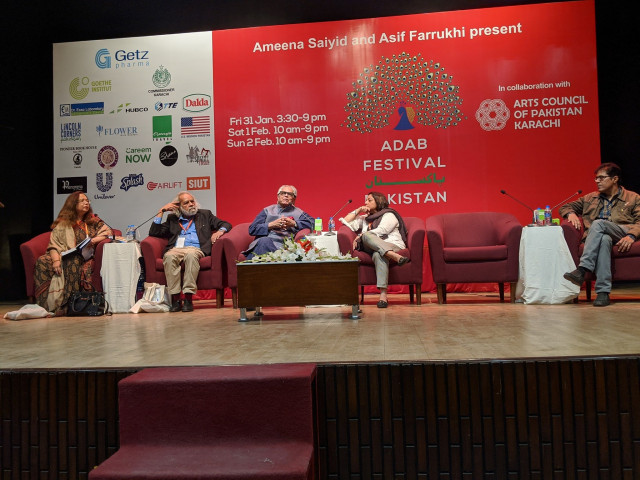Urdu - the last resort of failing students?
As the language evolves, its custodians are lagging behind in its development, say speakers at Adab Festival 2020

PHOTO: Adab Fest 2020
Debating the current state of Urdu literature, a panel of notable writers discussed “Urdu Main Naya Taza Kya Hai?” [What is New in Urdu?] on the second day of the Adab Festival, being held at the Arts Council, on Saturday.
“Farsi once used to be a customary part of our literature; now we need to translate it. I’m afraid that soon we may even need to begin translating Ghalib,” said Arif. He maintained that though it was the role of the government to help cultivate language and culture, there were too many different organisations with clashing mandates in Pakistan. This, he said, only resulted in internal disputes and a lack of development of Urdu.
“There is still work that is being done, but it is not enough to help cultivate the literary justice the language deserves,” he observed, adding that the most one saw from these institutions were bans on one work of literature or another.
Writer Dr Fatema Hassan, who was moderating the event, proclaimed that “language is the religion of culture.” She claimed that even though Urdu had transformed to include words and phrases from the diverse abundance of languages in Pakistan, the institutions were lagging behind, and so, these evolving expressions were not added to the dictionary.
Touching upon the state of affairs of Urdu television, meanwhile, Urdu author Rafaqat Hayat pointed out that in the past, there had only been PTV, which demanded that its writers had good command over the language and strong literary capacity.
“With the introduction of private television channels, though, the focus is on revenue, and many a compromise is made on the quality of the literature behind the work,” he explained. “The fact that directors are seldom engaged in literary pursuits themselves has also meant that the quality of the content has diminished.”
Arif added that little was being done to produce quality cinema in the country too. “A few decades ago, only very good scripts were selected for production; the focus was always on good writing.”
Not all is lost, though. As Afzal Ahmed Syed pointed out, copious translation work is being done, with many great literary works being translated into Urdu for the masses to enjoy. Further, he finds that there is an increasing number of critical books being printed in the language, widening the scope of Urdu literature beyond just poetry and novels.
While the speakers conceded that a revival movement for the language, kick-started by the youth, is underway, they remained underwhelmed by the work that has so far emerged from it.
A guest in the house
In a separate session, author Maniza Naqvi sat down with writer and journalist Syed Kashif Raza to discuss her new book, A Guest in the House.
Naqvi, although based in the United States, spent much of her youth in Karachi. And it is Karachi that happens to be the subject of her new book.
Exploring what it means to be a Karachiite, the book attempts to unearth what the city has to offer and why, despite having lived in different places across the globe, it continues to capture the hearts of so many. Painting a glorious picture of the metropolis, it romanticises the culture and the architecture that entranced her as an outsider experiencing the country in her youth.
While Naqvi claimed that there was no part of Karachi she didn’t adore, Raza challenged her love for the city, and particularly its historic locales, as being contradictory to her anti-colonial narrative. As he pointed out, most of the buildings and development in these areas are a product of the British Raj.
Naqvi, who has previously been vocal in calling out colonial apologists, conceded that she had been asked the same question before, but the answer was a complex one. “Colonialism is not something to be celebrated, but it is impossible to escape your heritage,” she asserted. “This history is part of every Pakistani’s genetic makeup. It is important that we do not let it define us, but instead define and reclaim these spaces as our own.”
Highlighting the importance of such buildings, she added that she had successfully attempted to save a bookstore near the Arts Council itself. “If these places are lost, then we as a city will suffer a great cultural loss,” she insisted, adding that spaces like small independent bookstores are becoming rarer even in cultural hubs such as London and Paris.
For Naqvi, we are guests in this world. How we treat the world, therefore, and what we leve behind is what matters in the end.



















COMMENTS
Comments are moderated and generally will be posted if they are on-topic and not abusive.
For more information, please see our Comments FAQ